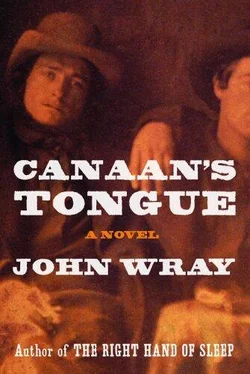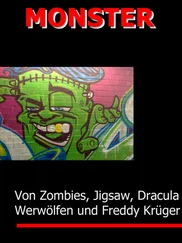“Lay down your burden, brother!” he said, patting the cushion next to him. “How long has it been? Four years? Six? Aren’t you surprised to see me?”
“I’d heard you might be on this boat,” I said.
Beauregard squinted back at me with genuine wonder. “How, by god?”
“I’m not the Redeemer’s only opera-glass, Lieutenant.”
This half-hearted joke was lost on him, of course. He regarded me soberly for an instant, then replied—: “Either Morelle’s hoo-doo works better than I’ve credited, or the Trade’s grown even bigger than I thought. I myself didn’t know that I was going to be on this boat, Mr. Ball, until five o’clock this morning.” He pushed the bottle toward me.
“What are we drinking to, Lieutenant?”
His air of satisfied stolidity returned. “You knew I was going to be on this boat, sirrah, and yet you ask me that?”
I poured myself a glassful, took a good-sized sip — it was really very fine — and felt suddenly inspired. Only one thing could have put him in such high spirits. “To your promotion?”
“You’re a sly old toad, and no mistake!” Beauregard crowed, striking me between the shoulder-blades three times in quick succession, as though I was choking on a giblet. He seemed to remember me as his dearest, truest comrade—; and I was disinclined, just then, to set him straight. I detected the Redeemer’s hand, clear as heat lightning, behind Beauregard’s turn of fortune. Perhaps I’d discover something I could use.
I drained my glass and the lieutenant refilled it at once. This, it was evident, was not the afternoon’s first bottle—; it was safe to assume that the promotion had been a large one. I wondered which wires Morelle had tugged upon, and precisely which advantages he stood to draw. War between the states — the possibility of war — was at the bottom of it, that much I knew. It had been his sole obsession the last few months.
We drank to one another’s health. “It must be quite an advancement, Lieutenant, if they’re calling you all the way to New Orleans,” I offered.
Beauregard held up a crack-nailed finger. “ Not New Orleans,” he said. “I’m off to Charleston in the morning—; to the battery in Charleston harbor. And guess why I’ve been sent for, Mr. Ball.” He scratched his head thoughtfully, as though trying to work out a sum. “Guess in what capacity. ”
“Mess cook?”
He gave a loud guffaw at this—; nothing, it seemed, could spoil his self-regard that evening. “Not on your life, sir! Not by half.” He wetted the ends of his moustaches with his tongue. “I’ve been commissioned, Mr. Ball. Three stars.”
I hushed for a spell, genuinely stunned. “ General Beauregard,” I said, when I could say anything at all. “I’ll be damned.”
“Not yet,” Beauregard said, grinning like a donkey. “Not until I get to Charleston.”
He went quiet after that, focusing, no doubt, on some point in the foreseeable future when he’d be crowned first commander-in-chief, then president, then Imperator of the New World by a diet of generals, congressmen, financiers, and kings. As I watched him, the memory of our first meeting at Madame Lafargue’s — his arrogance, his insults, Clem’s following him downstairs — came back to me in luminous detail. No sooner had it done so than the desire to murder him stole over me like laudanum.
I resisted the urge, however, potent though it was—: to indulge it would have cost me the Redeemer. Looking back, of course, I regret my decision bitterly. How much might have been different if General Beauregard had never reached Charleston harbor!
At the time, however, I was ignorant of the Redeemer’s true design. And so, I soon learned, was Beauregard himself.
“Have you had much contact, lately, with He Who Shall Go Unnamed?” I asked.
Beauregard shook his head sleepily. “The Trade doesn’t need me to cover its tracks anymore, Virgil. Mightier personages than myself have its interests in their care.” He filled our glasses yet again. “I haven’t heard from our benefactor in over a year.”
“He hasn’t forgotten you, though, it seems.”
I’d thought this might finally rouse him, or at least put him out of sorts—; but he only pursed his lips. “I know he hasn’t. I still get my dividend, first of every month.”
“That must be a comfort.”
“I don’t mind telling you, sir, it isn’t. ” Beauregard frowned. “I’m a man who likes to work for his upkeep, strange though that may seem.” He ran a hand through his thick, bear-greased hair, on which the rim of a lieutenant’s cap was still perfectly imprinted. “I’m hoping our little friend won’t get wise to my change of address.”
I couldn’t help but grin a little. “Oh! I think he might,” I said.
Beauregard only grunted.
“What’s the state of things, by-the-bye, with the Yankees up in Charleston?”
He bit his lip. “Touchy. There’s a good bit of — debate, I guess you’d call it — about a fort on an island in the harbor. Name of Sumter. The Yankees have it, you see. And they don’t want to give it over.”
I’d heard the name of Sumter before, from the Colonel and Kennedy. “And what’s your opinion? Should they?”
Beauregard shrugged his shoulders charmingly. “I don’t have an opinion, actually.”
I smiled at him. “You’ll most likely have to develop one, General, if you’re taking command of the Dixie batteries.”
“It won’t be my decision,” Beauregard muttered. I’d finally gotten him riled. “You do comprehend, don’t you, that one hasty decision there could start a war? Rest assured, Mr. Ball—: my orders on the Sumter question will be handed down from on high.”
“I have no doubt of that,” I said.
I was beginning to see the scale on which Morelle was playing, and it robbed me of my breath. Close as I’d been — or believed I’d been — to him, I was utterly confounded by this new intelligence. My brain went hot and pricklish, cringing and expanding, trying to get the outline of it clear.
My thoughts ran as follows—: (I) Abolition, if the papers were to be believed, had free run of the Union. (II) Even our new president was rumored to indulge in it, if thus far only in secret. (III) Abolition provided the Trade its cover, but an over-dose would prove lethal—; even secession, that most desperate of bluffs, might not manage to save us. (IV) If bluffing fell short of the mark, what then—?
“What’s the likelihood of war, do you think, General?”
Beauregard chewed on this a while. “I don’t think it must necessarily happen,” he said at last. “There’s a good deal of talk, on both sides, about preserving the Union. In spite of the all the fire-works—” He paused. “To be honest, I have no idea. If some manner of common ground could be reached on the slavery question — on slavery in the territories, at least. .”
I thought back to my parting words with Morelle. Divided as they were over slavery, he’d said, North and South were united over one thing—: the Trade. The powers that be — all of them — had come to view it as an intolerable evil. “They hate us heartily, dear K,” he’d said to me. “We can only hope, for the sake of our little métier, that they hate each other more.”
Now those last words had a new import for me. I sat on the divan in awe-struck silence, staring past the faro-tables at the tumbling brown river. The card-players had fallen strangely silent—; Beauregard, for his part, was adrift in a port-tinctured reverie. His exultation had altogether passed away and he looked haggard and remote. I excused myself and retired to my cabin.
Читать дальше












